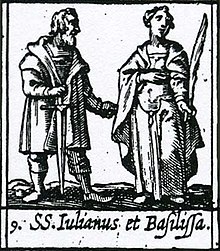Julian and Basilissa
Julian von Antinoë († around 304) and his wife Basilissa were a Christian Egyptian couple who dedicated themselves to nursing. They are venerated as saints .
Legend
Julian and Basilissa, who presumably came from Antinoë , were married by their families against their will, but decided to live in strict abstinence and to dedicate themselves to Christian charity as benefactors . They gathered monks and nuns around them and set up a hospital for the sick and needy in their home .
Basilissa died at the beginning of the 4th century. A short time later, probably around 304, Julian was captured and sentenced to death by a governor named Marcian during the persecution of Christians by Diocletian . In captivity he converted Celsus , Marcian's son, and his mother Marcanilla to Christianity. Both were executed along with Julian, a priest named Antonius and another man named Anastasius, and others. They are venerated as saints and martyrs .
Adoration

Soon after their death, Julian and Basilissa were venerated as saints; the early veneration is already documented by the Martyrologium Hieronymianum and the Calendario Marmoreo di Napoli . Relics are kept in the churches of Santa Maria Maggiore and Saint Paul Outside the Walls in Rome and in St. Mark's Basilica in Venice .
The attribute of Julian and Basilissa is the burning idol . The feast days are both January 9th ( Catholic ) and January 8th ( Orthodox ). Other days of remembrance are January 6th or 13th, February 13th or June 21st, depending on the source.
Mingling with other saints
Over time, Julian of Antinoë was equated with other saints of the same name or the individual legends of the saints were mixed, especially with Julian of Tarsus and Julianus Hospitator , which leads to Basilissa's husband also being incorrectly referred to as Julian of Antioch or Julian the Hospitable .
Farmer rules
There are peasant rules for Saint Julian , which were as follows:
- "St. Julian breaks the ice, or he'll bring it with him from his rice. "
- “Saint Julian breaks the ice; if he doesn't break it, he hugs it. "
Churches
Especially in south-western Europe there are numerous churches with the common patronage of the two saints (e.g. in Bozoó , Rebolledo de la Torre , Horcajo de las Torres , all in Spain, or in Bram , Terrats , Villemolaque , all in France) ; but also churches with the sole patronage of St. Julian appear.
literature
- Ekkart Sauser : Julianus and Basilissa. In: Biographisch-Bibliographisches Kirchenlexikon (BBKL). Volume 15, Bautz, Herzberg 1999, ISBN 3-88309-077-8 , Sp. 778-780.
- Julianus, pp. (6) . In: Johann E. Stadler , Franz Joseph Heim, Johann N. Ginal (eds.): Complete Lexicon of Saints ... , Volume 3 ([I] K – L), B. Schmid'sche Verlagbuchhandlung (A. Manz ), Augsburg 1869, pp. 518-520 . - (also here )
- Léon Clugnet: Sts. Julian and Basilissa . In: Catholic Encyclopedia , Volume 8, Robert Appleton Company, New York 1910.
